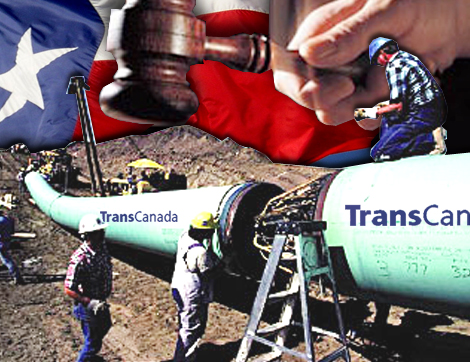
• Local judge approves landmark property seizure, but citizen will not back down
By Mark Anderson
On August 22, Lamar County, Texas Judge Bill Harris ruled in favor of TransCanada, extending its controversial Keystone XL oil pipeline. He claimed the private petroleum company somehow qualifies as a “common carrier” and can forcibly take private land from local rancher Julia Trigg Crawford. His decision effectively laid the groundwork for the Alberta-based company to plow over any Texan in the pipeline’s path.
This was all done with a well-oiled legal land-grabbing process called “eminent domain.” Evidence is lacking that TransCanada “meets the statutory requirements of a common carrier whose pipeline is a legitimate public use,” stated a press release from an activist group, Texans Uniting for Reform and Freedom (TURF).
TURF has teamed up with the group We Texans and others in a battle that resembles the long, bitter fight over the Trans-Texas Corridor (TTC).
That fight led to the TTC’s apparent abolition as a formal project in state law. However, the TTC, a “free-trade turnpike” borne of the North American Free Trade Agreement (NAFTA), still may plow through a living room near you, since it reportedly has been resurrected, via legal tricks, to haunt Texas ranchers once again.
Just as the mammoth TTC would allow an even bigger deluge of shoddy Chinese merchandise into America—arriving at Mexican ocean ports and sent by truck and rail into the U.S.—the Keystone XL would transport thick “tar sands” oil sludge, at a high temperature that puts great stress on the 1,700-mile pipeline, from Canada to Texas oil refineries, with the final product going, at least partly, to China. Talk about a double-cross.
“Since the Texas Railroad Commission determined way back in 2008 that it had no jurisdiction over TransCanada’s interstate pipeline, it simply defies logic that TransCanada is allowed to take private citizens’ land under a Texas law that requires a pipeline operator to subject itself to the commission’s jurisdiction,” Wendi Hammond, Ms. Crawford’s lawyer, was quoted as saying. “The Texas Supreme Court has repeatedly held that if there is an incident of doubt regarding the power of eminent domain authority, then a court must rule in favor of the landowner. Unfortunately, this judge failed to do so.”
Ms. Crawford has received donations for her costly legal defense and will soon appeal this ruling before the three-judge Sixth Court of Appeals in Texarkana, Texas, perhaps in early October. And since Judge Harris isn’t exactly the Stephen Hawking of complex corporate cases, she’s relieved that the appellate court is accustomed to complicated matters. “Judge Harris’s disappointing decision . . . further highlights the vulnerable and precarious position that Texas landowners are in,” commented Debra Medina, the former GOP candidate for governor who, in 2010 debates, tripped up Texas Governor Rick Perry, a corporate handyman who proved himself as an unarmed opponent in a battle of wits. “These [local] courts lack the resources to properly consider the complex and voluminous evidence assembled by multibillion-dollar corporations,” said Ms. Medina.
Tom Smith of Public Citizen concurred that pipelines like the Keystone XL carry an environmentally hazardous sludge—not for the nation’s oil independence “but for export, from a foreign land [Canada], through our pipelines, to a port that’s going to ship [the product] to foreign lands.”
Smith added: “These are not ‘common carriers’ for the ‘common good’ of Texans—this is a pipeline designed to speed [dirty] oil through Texas.”
Thus, as North American resources are harvested, the people, especially United States citizens, are denied all but the limited benefits of temporary construction and specialized refinery jobs, while still being forced to pay whatever price Big Oil assigns to a gallon of gasoline.
Mark Anderson is AFP’s roving editor. Listen to Mark’s weekly radio show and email him at [email protected].

